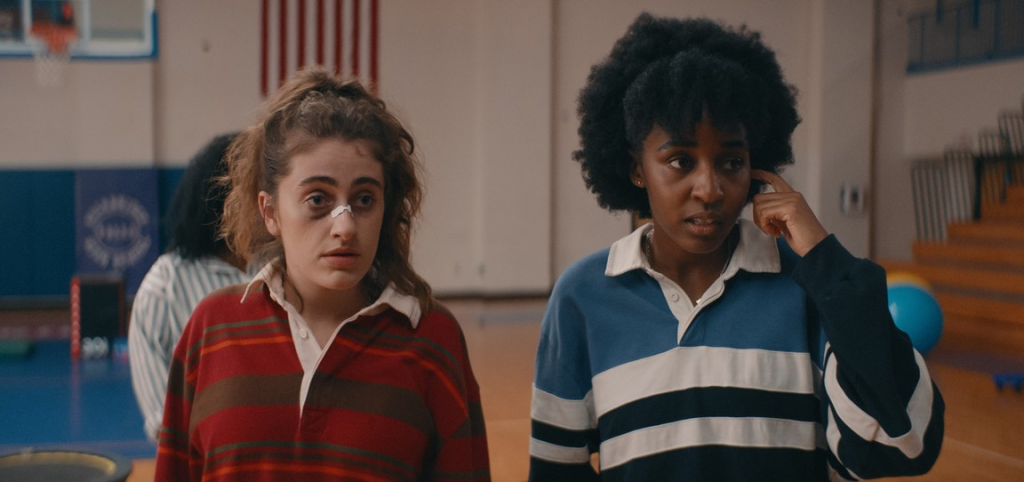From “Barbie” to “Oppenheimer,” this summer has already seen a great revival of movie theater attendance, and the queer, semi-off balance comedy, “Bottoms,” is no exception.
Having already hauled in around $8.5 million from the box office, director Emma Seligman’s sophomore film has become a major hit during this theater renaissance, and its somewhat unhinged — although certainly entertaining — comedy has certainly proven itself worthy of the acclaim.
Following two unpopular queer teens in their journey to have sex with the two most popular cheerleaders in the school, this film flips the age-old coming of age movie a la “Superbad” or “American Pie” on its head when PJ (Rachel Sennott) and Josie (Ayo Edebiri) start a fight club — because there’s nothing like punching your crush in the name of female solidarity.
Taking place in a hyper-stereotypical American high school where football players never take off their uniforms and teachers only care about their students when it involves popular jocks or cheerleaders, “Bottoms” sets the stage for an intense focus on impossibly heightened social politics of high school. Within this cluster of stereotypes, PJ and Josie fill the role of “ugly, untalented gays” who turn rumors that they went to juvie into a fight club.
This club, of course, is simply a ruse in order to get close to their crushes, Isabel (Havana Rose Liu) and Brittany (Kaia Gerber), two incredibly popular cheerleaders. The biggest issue — Isabel is already dating Jeff (Nicholas Galitzine), the star quarterback of the football team and tyrannical king of the school. This fact does not deter PJ and Josie in any way, as their hopes, known only to their friend and club co-founder Hazel (Ruby Cruz), are that this club will empower Isabel to break up with her boyfriend.
Even within the set-up of the movie, there is comedy in every pixel of the screen. From the eclectic mix of studious decoration in the background of classrooms to the hilariously awkward interactions between the main characters and their crushes, this film is filled with jarring, over-the-top comedy, although a slightly unclear message.
There is certainly a sense of “sisterhood” emphasized by many of “Bottoms” characters, although PJ and Josie make it very clear that that is not the point of their fight club. PJ in particular is a well-developed although extremely morally gray character who seems to learn more about selflessness toward the end of the movie. This is a film with multiple villains and one that does not shy away from questionable ethics within the characters that the audience is meant to be rooting for.
Although many of the characters involved in the fight club are there for female companionship and friendship — most notably Josie’s love interest, Isabel — the main object of the club is to get close with popular cheerleaders. This highly questionable plan is mainly formulated by PJ, our protagonist with morals almost as loose as the hilariously egotistical Jeff. It just so happens that the poor decisions made by our main characters lend themselves to the creation of a compelling plot and aid in highlighting the significance of companionship among women by the end of the film.
One detail that goes a bit unfinished, however, is the fact that there is little true reconciliation between PJ and those that she wrongs while dealing with her own lack of confidence. Although the movie ends on a high note, the arc of this character lacks some clarity. Still, despite the quick runtime at just an hour and a half, the audience really gets to know the characters — their insecurities, their communication styles, their strengths and their weaknesses.
Seligman did a ton right with this film, and the cast clearly added so much to their characters. Cruz’s Hazel is fearlessly honest and casually amusing, Sennott compliments Gerber’s mean girl hilarity with PJ and Brittany, and Edebiri fits quite comfortably with her lovably anxious Josie, whose awkwardness comedically interacts with the confidence of Isabel, played by Liu. Even the character Jeff, the villainous football player, introduces a unique and camp depiction of the heightened stereotypes that make this film so distinctively funny.
This movie is weird and over-the-top and that is what makes it so entertaining. For such a quick runtime, it manages to address issues within American high school social culture in ironic and hilarious ways. It certainly leaves something to be desired both in providing solutions tor the lack of confidence so many of the high schoolers depicted feel, and in completing the arcs of the characters.
Still, Seligman takes on the great task of placing characters — that some may relate to and that may be utterly contemptible to others — and placing them in an over-exaggeration of high school interactions to entertain and remind the audience that ultimately, there is nothing quite as important as friendship for the sake of friendship — and that, sometimes, violence is the answer.



